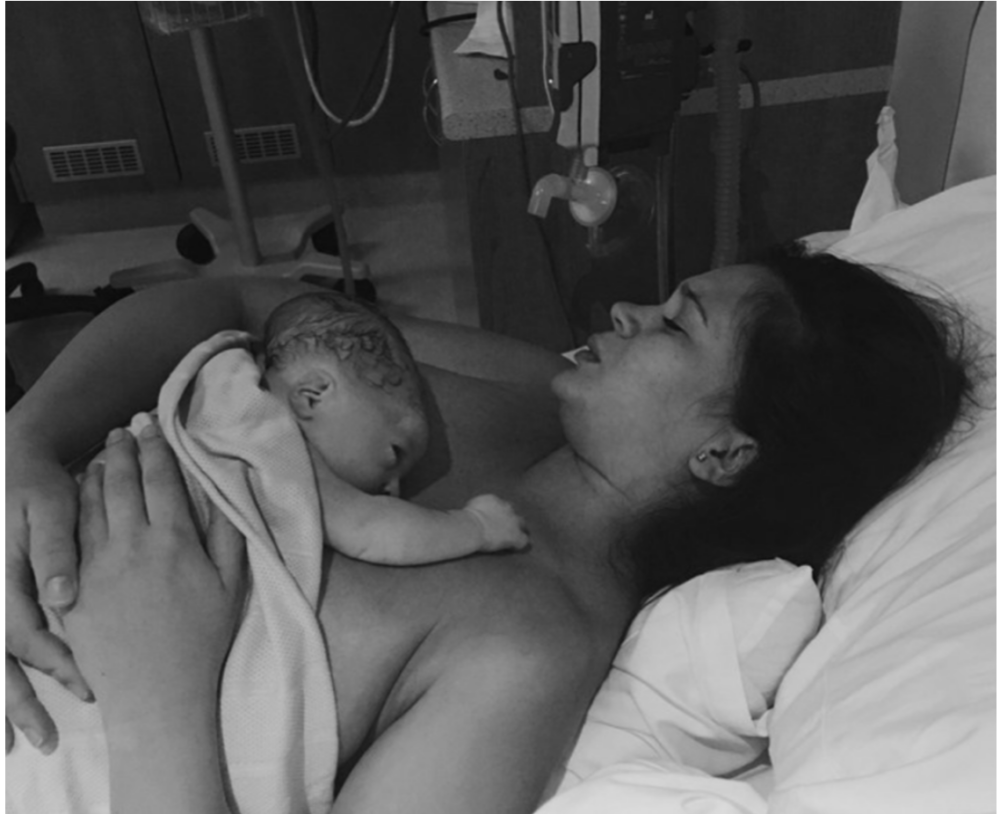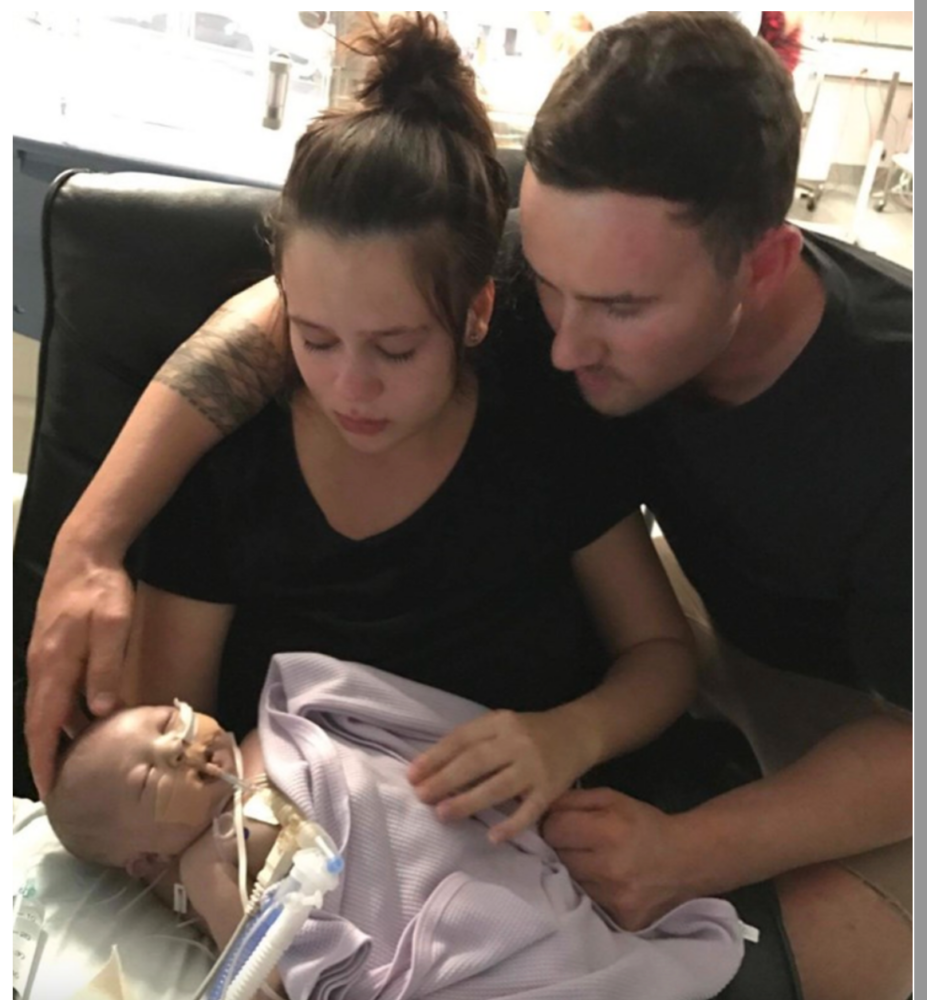
Losing baby Foxx from GBS is something Mikhailla will live with forever.
Group B streptococcus, often shortened to GBS is a symptomless and common bacteria, normally harmless and often found in the vagina, bladder, rectal passage and throat. It typically goes unnoticed and is carried by about 20 per cent of the population. But it can be deadly for a baby delivered vaginally.
We don’t want to discourage women from delivering vaginally, and GBS management is relatively straightforward, so they shouldn’t be. The simple way of avoiding passing the infection from mother to baby is a course of antibiotics at least four hours before delivery. And the infection can be found simply, by analysis of a swab sample.
A lot of mothers don’t realise the risks of GBS
But many young women are not really aware of the risks to newborns, says Mikhailla Fitzgerald.
Mikhailla learnt the deadliness of GBS in the cruelest way possible, when her beautiful newborn son Foxx died three days after birth, having become infected during birth. Typical of most newborn babies infected with GBS, Foxx became ill only hours after he was born. He died in 2017 but, understandably, today Mikhailla is still reduced to tears talking about his death.
GBS is the highest cause of sepsis and meningitis in newborn babies. About 3.5 of newborn babies per 10,000 born will become ill because of GBS. And one in 10 babies infected with GBS will die, according to the Oxford Vaccine Group, a research group within the Department of Paediatrics at the University of Oxford.
GBS is the highest cause of sepsis and meningitis in newborn babies.
And there is another tragic outcome. It notes: “Fifty per cent of babies who develop GBS meningitis will be left with some level of long-term disability such as cerebral palsy, deafness, blindness or learning difficulties. It can also cause stillbirth and may contribute to premature births.”
GBS often goes under the radar and screening approaches for pregnant women are inconsistent, both worldwide and in Australia. In the USA universal screening has been recommended since 2002. But screening is not universal in the UK, even though the Group B Strep Support group has advocated consistently for this. They explain on their website that the rate of GBS infection rose 77 per cent in the UK between 1996 and 2020.
Australia doesn’t have a GBS policy
Australia has never had a national GBS policy. Here, every state takes a different approach.
In Queensland, Mikhailla’s home state, screening is only done for those considered to be at risk. Universal means every pregnant woman is screened, risk-only is just as it sounds. NSW takes a combined approach, doing universal screening in some places and circumstances and in others a risk-based approach. The latest guidelines from the Royal Australian and New Zealand college of Obstetricians and Gynaecologists (RANZCOG) say either approach is okay.
But what’s an at-risk patient in a condition which is symptomless? Queensland, NSW and Victoria all explain on their websites that the following are counted as risks.
- Previous baby infected
- GBS in urine any time in your pregnancy
- Labour before 37 weeks
- Temperature in labour higher than 38 degrees
- Signs of infection around the baby
- Labour 18 hours or more before the waters break.

But you could have none of these and still be positive for GBS.
This is why ‘universal’ routine antenatal screening is offered. But this is not universal for the whole state, rather, for your health district.
“In fact, in Australia, not only is there is no standard screening protocol, it varies from hospital to hospital and obstetrician to obstetrician,” Mikhailla says.
Ambiguity around the role of screening is not just a matter of cost. It’s because the case for screening hasn’t been made conclusively in large population studies.
A major study, published in 2019 and conducted in the New England Health district of NSW over an 11-year period and involving 62,281 women, found that universal screening didn’t really deliver a better survival rate for babies.
“Based on the results of this study we, along with others, strongly recommend that primary attention to risk factors for Early Onset GBS infection and timely prophylaxis or antibiotic treatment as indicated would be a more effective strategy for reduction of EOGBS in both preterm and term groups rather than the universal screening approach which failed to identify all infants at risk.”
Early onset is before the baby is six days old.
It pointed out that “Seven of 10 term babies with EOGBS were born to mothers who screened negative.”
And this is exactly what happened to Mikhailla.
Mikhailla was living in Darwin, where screening for GBS is mandated, during her pregnancy with Foxx and was tested there during the pregnancy. But the test came back negative, so she was not administered antibiotics during the labour. This is a sad twist to her story. Because the result must have been a false negative. GBS is known to have a high false-negative rate – 13.2 per cent reported in a 2006 study in Obstetrics and Gynaecology.
And Great Britain’s Group B Strep Support group warns on its website of current high false negative rates.
This was something Mikhailla wondered about in an unshaped kind of way.
“I actually questioned it because I had vaginal thrush during my pregnancy,” she says.
Candida albicans, or thrush, which just about every woman knows, can lead to a maddening itch in the vagina. Unsurprisingly, Mikhailla’s concerns about this led nowhere. Thrush can happen because hormonal balances have changed, simply due to the pregnancy. It can also happen because sugar levels in the blood are high and gestational diabetes is looming. So there are plenty of distractions that can lead away from a link to GBS.
Thrush has been shown to be an independent risk for GBS in the vagina, although a 2018 paper discussing this said the “nature of interactions between these two microbes is poorly understood”.
So what if we were just to deliver antibiotics anyway, to protect all women about to deliver?
This is not the straightforward solution it seems. Apart from the cost there are other issues involved. Few women want to have antibiotics administered at birth for something that may or may not happen. Having the antibiotics involves being tethered to an IV to deliver them, so it’s quite restrictive.
Many women are wary of unnecessary intervention and the use of antibiotics has to be weighed up.
As the Queensland guidelines point out, the risks associated with antibiotics in newborns include:
- Alteration to the microbiome and gut colonisation
- Increase in the risk of necrotising enterocolitis
- Overall delay in breastfeeding initiation through maternal-infant separation and formula supplementation
- Impact on long term health including obesity, autoimmune diseases and antimicrobial resistance.
These are real issues to consider.
Other women share their stories
Good Grief! spoke to three young Sydney mothers about their GBS management, and just as Mikhailla had predicted, approaches to their pregnancy and GBS were all as different as approaches to screening.
Marie has given birth to three children and developed GBS with baby number three.
“Testing for GBS was part of my obstetrician’s management, it was never a question of whether or not I would have the test. When he told me I’d need IV antibiotics, I checked in with three girlfriends to see whether they knew anything about it. They’d all tested positive for GBS and said that plan was to be expected.”
Her obstetrician swabbed her at week 27, when he tested her for gestational diabetes and then again at week 37. It was then that she tested positive to GBS. When Marie arrived at the hospital a few weeks later to give birth, she was immediately put onto an IV drip, to administer antibiotics. The midwife told her clearly that because of her GBS status the IV line was to be inserted as a top priority.
But her baby was born 20 minutes later, so would that have been enough time for the antibiotics to be effective?
Mae has given birth to two sons. She tested positive to GBS during pregnancy number two. She was tested at 28 weeks and was to be tested again in week 37 but just before this, her waters broke. Labour didn’t start. Her obstetrician induced her baby because this scenario increases the risk of infection to the baby. But Mae was not administered antibiotics for GBS.
Jane was managed by midwives and was a public hospital patient. She was given a kit to swab herself in the bathroom before 34 weeks.
“I was positive but when I went into labour, by the time I got to hospital it was too late for me to be given the antibiotics. So after my daughter was born we knew that if she developed a fever there would be a low threshold for her to have a lumbar puncture”.
With all the options available some women end up missing out on information.
In fact, Jane presented to the hospital early in her labour but was given the choice to go home to labour there, a choice she took knowing that she was GBS positive. This contrasts to Marie’s experience where the nursing staff made it clear she would need to come into hospital as soon as she could get there, after the first hints of labour.
But with all the options available some women end up missing out on information.
As Mae explains: “I knew it was a risk but it wasn’t on my radar. I didn’t really register the risks until someone I knew of had a baby who got very ill with GBS but survived. When our mutual friend told me about it, she was shocked because she had had a baby but didn’t know anything at all about that risk. ‘I’ve had a baby recently, so why didn’t I know about?’ she said to me.”
And Jane: “Our midwives explained the risks of GBS really clearly. But there’s a real trend for women saying they don’t want the GBS test because they don’t want their baby to be exposed to antibiotics. Another reason is that if you have the drip it lowers your mobility so I know of women who’ve refused it for that reason. They would typically refuse other interventions too.”
To Good Grief!, the range of experiences and approaches suggests expectant mothers should be given access to more information.
Chat rooms and young mothers
Despite her grief, Mikhailla is getting on with life. She has produced two children’s books, My Sibling Above and Love From Above to help her two children, born after his death, to get to know Foxx. She also believes these books will help other children dealing with sibling grief.
As a celebrated ‘mummy blogger’ Mikhailla is aware that many women get their information from their chat groups and other mothers’ groups online.
And she’s often in chat room discussions where women debate whether to have the test and the antibiotics.
“I’ve definitely been part of them when women have tested positive and they’ve debated whether to have the antibiotics. A lot of women don’t seem to realise the risk is the death of the baby. I struggle with that. I want to make sure mis-information is not shared online.”
So Mikhailla continues sharing her story.
Because too few women realise what the death of their baby from GBS feels like – that it was a missed opportunity to manage an infection that could have been avoided, yet yielded such a devastating result, she explains.
Resources
Love From Above and My Sibling Above can be purchased directly from the Wholeheartedly website, at:
https://wholeheartedly.com.au/collections/childrens-books
The Oxford Vaccine Group is a vaccine research group within the Department of Paediatrics at the University of Oxford’s website on Group B Strep can be found at:
https://vk.ovg.ox.ac.uk/vk/group-b-strep
Great Britain’s Group B Strep Support group is at:
https://gbss.org.uk
Queensland Clinical Guidelines: Early onset Group B Streptococcal disease:
https://www.health.qld.gov.au/__data/assets/pdf_file/0026/626732/g-gbs.pdf
The Grief of a Child
https://good-grief.com.au/the-grief-of-a-child
Mikhailla’s story of losing Foxx, can be viewed here:
https://youtu.be/xpKZvQThfVE

